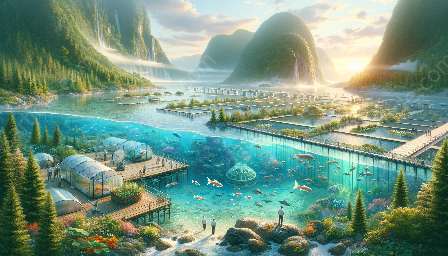Aquaponics System: A Sustainable Approach to Farming
Aquaponics is an innovative and sustainable farming method that combines aquaculture and hydroponics. It is a closed-loop system that utilizes the waste produced by aquatic animals to provide nutrients for plants, which in turn purify the water for the animals. This integrated system has gained significant attention in both aquaculture and fisheries science as well as applied sciences due to its potential in sustainable food production and environmental conservation.
The Science of Aquaponics
The science behind aquaponics revolves around the symbiotic relationship between fish and plants. In an aquaponics system, fish waste, mainly ammonia, serves as a source of nutrients for plants. Beneficial bacteria in the growing media and water convert the ammonia into nitrates, which plants can readily absorb as nutrients. As the plants take up these nutrients, they purify the water, which is then recirculated back to the aquatic environment, providing a clean and healthy habitat for the fish.
Connection to Aquaculture and Fisheries Science
Aquaponics holds great significance in the field of aquaculture and fisheries science. It offers a sustainable method for raising fish while simultaneously cultivating plants. By integrating these two practices, aquaponics becomes an efficient and environmentally friendly way to produce food. Researchers in this field are continually exploring ways to optimize the performance of aquaponics systems, enhance fish and plant growth, and improve overall system management.
In aquaculture, aquaponics systems provide an additional revenue stream by allowing fish and plants to be cultivated simultaneously. This can lead to diversified and resilient farming practices. Furthermore, the symbiotic relationship between fish and plants creates a balanced ecosystem that mimics natural environments, which is a key focus in fisheries science to ensure the sustainability of aquatic resources.
Applied Sciences and Aquaponics
Aquaponics aligns with various principles of applied sciences, including biology, chemistry, and environmental science. Studying the microbial communities involved in nutrient cycling and biofiltration in aquaponics systems contributes to our understanding of microbiology and ecosystem dynamics. Additionally, the optimization of water quality management in aquaponics involves principles of environmental engineering and water treatment technologies, making it an attractive research area in applied sciences.
Furthermore, the development of aquaponics systems requires interdisciplinary collaboration, involving experts in agriculture, engineering, and environmental science. This interdisciplinary approach reflects the essence of applied sciences by integrating knowledge from various fields to address practical challenges in sustainable food production and resource management.
Benefits of Aquaponics
Aquaponics offers various benefits that make it an appealing farming method:
- Sustainability: The closed-loop nature of aquaponics minimizes water usage and eliminates the need for synthetic fertilizers, making it an environmentally friendly and resource-efficient farming practice.
- Productivity: By efficiently utilizing the nutrient-rich fish waste, aquaponics can produce a high yield of both fish and plants in a relatively small area compared to traditional farming methods.
- Water Conservation: Aquaponics uses approximately 90% less water than conventional soil-based agriculture, making it suitable for water-scarce regions and contributing to conservation efforts.
- Environmental Impact: The integration of fish and plants creates a balanced ecosystem that minimizes environmental impact, reduces nutrient runoff, and promotes biodiversity.
- Education and Research: Aquaponics provides opportunities for educational institutions and research organizations to study sustainable farming practices, biology, and environmental sciences, enhancing our understanding of ecosystem dynamics and sustainable food production.
Conclusion
Aquaponics represents a holistic approach to sustainable food production, aligning with the principles of aquaculture and fisheries science, as well as various disciplines within applied sciences. It offers a promising solution to the global challenges of food security, water scarcity, and environmental sustainability. By harnessing the symbiotic relationship between fish and plants, aquaponics has the potential to revolutionize modern farming practices and contribute to a more sustainable future.

